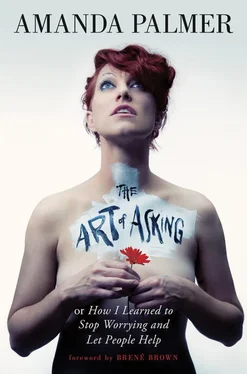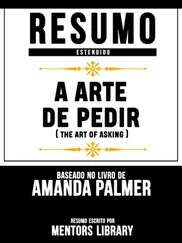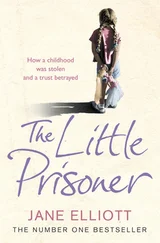You had my life! I said. And I’m not even that poor anymore. I can afford food. But I’m still freaked out .
Ha. I get it. You know, I’m glad you asked me… because I didn’t have anyone I could ask. It was really lonely, and in this creepy way that sort of made you feel like a jerk for being upset about it .
That didn’t sound familiar at all .
• • •
From the start, The Dresden Dolls functioned in an artistic community that depended on messy exchanges of goodwill and the swapping of favors. More than a decade later, when the outside world was trying to make sense of my million-dollar Kickstarter success, I found myself digging through the past, trying to explain how it worked.
The New York Times called. Forbes magazine called.
Tell us, Amanda, can you explain this relationship you have with your fans?
Are you married? I’d ask.
Actually, yes. My wife, Susan, and I just celebrated our tenth anniversary last week!
So tell me, can you explain this relationship you have with your wife?
At least I’d make them laugh.
Like all real relationships, my “special relationship” with my fans wasn’t some shtick that I came up with at a marketing meeting. On the contrary, I’ve spent many marketing meetings banging my head against a long conference table.
Throughout my career, the fanbase has been like one big significant other to me, a thousand-headed friend with whom I have a real, committed partnership. I don’t take vacations from communicating without warning. We share our art with one another. They help me run the business by feeding me constant information. I cop to my mistakes. They ask for explanations. We talk about how we feel. I twitter to say good night and good morning, the way I would with a lover. They bring me food and tea at shows when I’m sick. I visit them in hospitals and make videos for their friends’ funerals. We trust one another. Occasionally, I’ve broken up with fans. Some have broken up with me.
In the band’s first three years, we played in friends’ illegal lofts, in makeshift art galleries, in crappy sports bars that were trying to lure in drink-buying customers with the promise of live music, in people’s living rooms, in used clothing stores, at benefits for feminist sex-toy shops. Whether we were being paid or not, if it was a gig, we took it.
But mostly we just played at my house, since we could always get a gig there. I was already in the habit of throwing huge parties. Lee loved it when the Cloud Club came alive with guests, and my new housemate, the filmmaker Michael Pope, became a co-conspirator in organizing bashes at which we would cram people into the various floors of the house, and out into the back garden and onto the roof in the summer. We put a shoebox at the door of the house with a sign suggesting (but not requiring) a ten-dollar admission, and set up a bar in every kitchen, spending the rolling donation money on wine, beer, and vodka. Anybody could bring whatever they wanted to share, be it food, drink, art, or music. I was perfectly happy letting four hundred strangers waltz through my kitchen and bedroom; I had nothing so valuable in my apartment that I ever had to hide it.
The entirety of The Dresden Dolls’ travel inventory (electric piano, five-piece drum kit, and a few old suitcases full of costumes and the band T-shirts we sold for $10 each) could be perfectly Tetris’d into the back of my beat-up Volvo station wagon (affectionately dubbed The Vulva). We started driving farther and farther distances from Boston to take gigs. Brian was the technical expert (he knew everything there was to know about gear, including where to buy it and how to set it up), and I was the band’s manager, press agent, and booking agent. I’d just bought my very first cell phone.
It was 2001 and email was still coming into vogue (and slightly suspect—lots of people in my artistic social circle resisted it), but I was obsessive about maintaining an email-based newsletter for the band and for the house parties. I could send out an email to fifty Boston friends, they would spread the word, and two weeks later, hundreds of people would show up at our house for a party. So the band’s email list began as the house-party inner circle, then grew every time we had a gig or a gathering—there was no distinction between fans and friends. Not only did most of our early fans know where I lived and where we practiced, but most of them had also been in my kitchen.
Eventually, since it seemed impolite to be extending Boston house-party invitations to our fans in St. Louis, we made one email list per city. I considered the email list our pride and joy—the Thing From Which All Other Things Stemmed. Any time I ran into an old college friend on the street, any time I got into a conversation with a stranger on the subway, any time someone expressed even a remote interest in the band, I’d ask, DO YOU DO EMAIL? If the answer was yes, I recorded their address onto whatever was handy—my journal, a napkin, my hand—and when I got home, I’d send a personal welcome note.
My own email address was front and center on our website. I emailed back and forth with individual fans daily—about our lives, our gigs, ideas for shows—and often included a few words of den-mother comfort, because much of the fan mail usually came with a harrowing personal story attached. People thanked me for the songs: “Half Jack” had helped someone come to terms with their own parents, “Coin-Operated Boy” was popular with dancers on the burlesque circuit, who used it for routines, “Girl Anachronism” spoke to people’s own battles with self-doubt. While Brian drove us to out-of-town gigs, I managed the band from the passenger seat on my bulky, blue, constantly crashing Dell laptop. Managing the band didn’t mean talking to labels, agents, or publishers; we didn’t know any. Managing the band meant making friends with other freaks in other cities, finding performers to share the stage with, lining up couches to crash on, chasing down a gallery where a friend was hanging paintings and was happy to have a band play at the opening.
Slowly but surely we amassed a local, then regional, following as we convinced our art-party friends to follow us into the rock establishments of Boston and beyond. Like the Cloud Club parties, the early concerts were more like happenings than straight rock shows. We’d bike around town posting up flyers that read:
THE DRESDEN DOLLS live THIS SATURDAY
at THE MIDDLE EAST NIGHTCLUB.
Doors 9 p.m. $12.
ALL ARE WELCOME.
DRESS FOR THE END OF THE WORLD,
OR THE BEGINNING.
People got a kick out of dressing up for our shows, and we encouraged it. Top hats, zoot suits, body paint, feather boas, and wigs were de rigueur. Our email blasts, which I sent out every few weeks, were celebratory missives, written to our friends. I kept the tone personal: Come to a party at the house. Or come to a Dolls show at a club. Or come to a Dolls show at the house. It was all the same.
• • •
I told Anthony I was thinking about dating Neil Gaiman. I was nervous. Anthony never judged me, but he judged my boyfriends (and occasional girlfriends) as fiercely as a protective older brother would.
So who is he? Anthony asked.
He’s a writer .
Never heard of him .
He’s like… cult famous. He writes comic books and science fiction and stuff. He’s forty-eight. And British .
Anthony emitted a guttural, rumbling sound of suspicion.
What? Which part? The Famous? The British? Or the forty-eight?
Читать дальше












